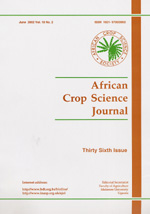
|
African Crop Science Journal
African Crop Science Society
ISSN: 1021-9730
EISSN: 1021-9730
Vol. 29, No. 2, 2021, pp. 241-258
|
 Bioline Code: cs21016
Bioline Code: cs21016
Full paper language: English
Document type: Research Article
Document available free of charge
|
|
|
African Crop Science Journal, Vol. 29, No. 2, 2021, pp. 241-258
| fr |
Ramathani, I.; Ddamulira, G.; Kangire, A.; Wasswa, P. & Tusiime, A.
Résumé
La tomate ( Solanum lycopersicum

L.) est un légume prioritaire en Ouganda, mais en raison de sa base génétique limitée, ses types cultivés sont sujets à une variété de maladies. L’objectif de cette étude était d’évaluer des génotypes de tomates sélectionnés pour leur résistance aux principales maladies de la tomate dans des conditions de hotspot en Ouganda. Quarante-cinq génotypes de tomates ont été évalués pour leurs réactions au flétrissement bactérien de la tomate, à la tache bactérienne de la tomate, au mildiou et au mildiou. L’étude a été menée pendant deux saisons des pluies en 2019, au National Crops Resources Research Institute, à Namulonge en Ouganda. Les données de gravité et d’incidence ont été recueillies à des intervalles de deux semaines après la transplantation. Douze génotypes (Nouvella F1, Rambo F1, Commando F1, AVTO1315, AVTO922, AVTO1701, AVTO1219, AVTO1464, MT56, ADV1287A, Pruna et Vega) présentaient des niveaux élevés de tolérance au flétrissement bactérien; tandis que la tache bactérienne présentait des symptômes bénins principalement observés sur Vega, Zodiac et AVTO9802. Rhino, AVTO1418, AVTO1314, Eureka, Roma VFN, MT56, Pinktop, Assila F1, Money-maker, AVTO0922 et AVTO1464 ont été les moins touchés par le mildiou; tandis que AVTO1219, AVTO1701, ADV12021, ADV12076 et ADV1287A ont exprimé de faibles valeurs AUDPC pour le mildiou. Dans l’ensemble, AVTO1315 a été le meilleur producteur (30,8 tonnes métriques ha -1), suivi par AVTO0301 (29,0 t ha -1) et Nouvella F1 (26,1 t ha -1). Parmi les génotypes de tomates évalués, nous recommandons AVTO1701, AVTO0922, AVTO1464, AVTO0301 AVTO1315, AVTO1219, Pruna, Vega, ADV1287A et MT56 pour les essais de performance nationaux.
Mots Clés
Bactéries; brûlure; gravité; Solanum lycopersicum
|
| |
| en |
Evaluation of tomato genotypes for tolerance to major diseases in Uganda
Ramathani, I.; Ddamulira, G.; Kangire, A.; Wasswa, P. & Tusiime, A.
Abstract
Tomato ( Solanum lycopersicum

L.) is a priority vegetable in Uganda, but due to its limited genetic base, its cultivated types are prone to a variety of diseases. The objective of this study was to evaluate new tomato genotypes for resistance to major tomato diseases under hotspot conditions in Uganda. Fourty-five tomato genotypes were evaluated for reactions to tomato bacterial wilt, tomato bacterial speck, early blight and late blight. The study was conducted for two rainy seasons in 2019, at the National Crops Resources Research Institute, Namulonge in Uganda. Data for severity and incidence were collected at two-week intervals after transplanting. Twelve genotypes (Nouvella F 1, Rambo F 1, Commando F 1, AVTO1315, AVTO922, AVTO1701, AVTO1219, AVTO1464, MT56, ADV1287A, Pruna and Vega) exhibited high levels of tolerance to bacterial wilt; while bacterial speck presented mild symptoms majorly seen on Vega, Zodiac and AVTO9802. Rhino, AVTO1418, AVTO1314, Eureka, Roma VFN, MT56, Pinktop, Assila F 1, Money-maker, AVTO0922 and AVTO1464 were the least affected by early blight; while AVTO1219, AVTO1701, ADV12021, ADV12076 and ADV1287A expressed low AUDPC values for late blight. Overall, AVTO1315 was the best yielder (30.8 metric tonnes ha -1), followed by AVTO0301 (29.0 t ha -1) and Nouvella F 1 (26.1 t ha -1). Among the tomato genotypes evaluated, we recommend AVTO1701, AVTO0922, AVTO1464, AVTO0301 AVTO1315, AVTO1219, Pruna, Vega, ADV1287A and MT56 for the national performance trials.
Keywords
Bacteria; blight; severity; Solanum lycopersicum
|
| |
© Copyright 2021 - African Crop Science Society
|
|
